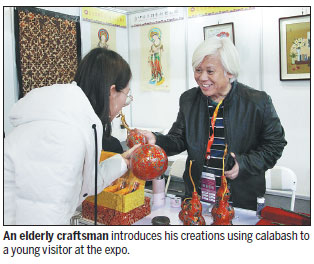Ancient handcrafts brought to life with passion at major event
Folk handcraft inheritors and enterprise exhibitors in Beijing gathered at the 13th China Beijing International Cultural and Creative Industry Expo last week, showcasing their practical solutions to help protect intangible culture.
The monkey doll, a unique ornament found in ancient Beijing households, is said to have been popular from the late Qing Dynasty (1644-1911).
With cicada shells used to create its head and limbs, and magnolia flower buds as its body, the technique used to make a monkey doll is a Beijing intangible cultural heritage item.
Chen Min, who has been helping to preserve the rich tradition and techniques used to create monkey dolls, brought her latest pieces to the expo.
Though in her 80s, she makes the dolls almost every day.

Chen studied the techniques of making monkey dolls after retiring, who joined one of Beijing's handcraft communities, a public service organization that promotes the retraining of retired, unemployed and disabled women.
The group makes all kinds of handcrafted products including paper-cutting, lacquer ware and Beijing Opera masks.
Hu Yuwei, another exhibitor at the expo, is an ancient brickmaking enthusiast. Hu works with Yuyao golden bricks, which were used to make the foundations of the Forbidden City in Beijing, where emperors lived during the Ming and Qing dynasties (1368-1911).
In the past two decades, he has been collecting the bricks in Beijing from all areas, exploring construction sites and ancient buildings, and visiting private collectors.
He has opened a brick-themed museum in Songzhuang art zone in Beijing's Tongzhou district.
The technique of making the bricks is regarded as intangible cultural heritage.
While the bricks can be restored with modern technology, the quality is not as excellent as was in the past, according to Hu.
"We have collected these bricks to enable Chinese people, young and old, to touch the real bricks with their hands and feel the intangible techniques inherited from our ancient ancestors," Hu said.
In addition to fans of intangible culture, at the expo, Beijing-based companies also provided their solutions for preserving ancient culture, simultaneously digging into new business opportunities.
Beijing Hegujingyuan Culture Co has opened a ceramics hall in the city's Tongzhou district. Not only displaying the tools and the products of ceramics, it also provides classrooms and lectures for children to design and make their own handcrafted ceramic products.
Beijing Baigongfang, a museum displaying various examples of traditional handcrafts, is another operation devoted to intangible cultural heritage protection in Beijing.
Offering lectures on the techniques of making jade ware, engraved lacquer, inlaid gold lacquer ware, palace carpet and embroidery, as well as monkey dolls, it has attracted visitors from China and abroad.
liyou@chinadaily.com.cn

(China Daily 10/31/2018 page10)














